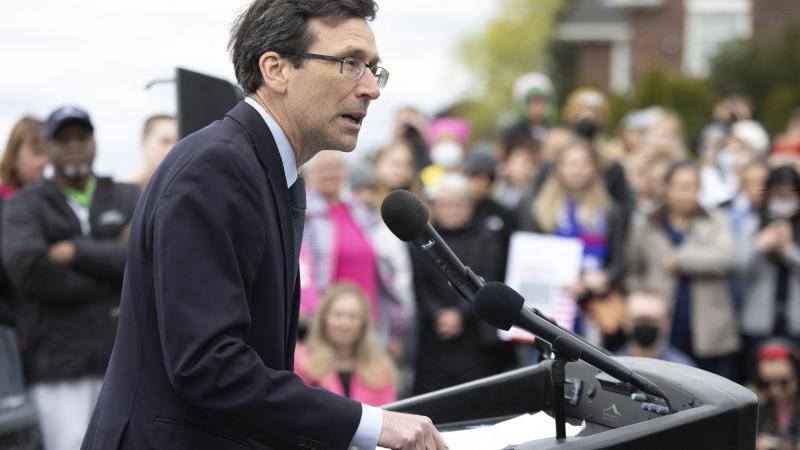Yale research: Race-focused language of 'Democratic elites' hurts their causes
It's politically safer to appeal to class interests because of "backlash from race framing" among Republicans, survey finds.
Public support falls for progressive policies when they are framed as helping racial minorities, according to a new paper by Yale University researchers.
It questions the wisdom of "Democratic elites," including President Joe Biden and Senator Bernie Sanders, racializing ostensibly race-neutral issues such as infrastructure, climate change and minimum wage increases.
Appeals to class interests are best at increasing support for progressive policies across racial and political groups "despite leftward shifts in public attitudes towards issues of racial equality," according to Josh Kalla, assistant professor of political science and data science, and doctoral student Micah English.
The April 23 paper is a preprint, meaning it has not been peer-reviewed yet. It has received applause from Yale sociologist Nicholas Christakis and New York magazine writer Jonathan Chait, but the paper has also drawn criticism for asking subjects separately about race and class.
An ongoing research project is seeking to build a unified "Race-Class Narrative" (RCN) that progressive activists and politicians can use to improve election turnout and policy victories. Kalla emphasized that the survey didn't test RCN language, but said he would be "happy to do a follow-up study" with such language.
Kalla and English didn't respond to queries from Just the News about the feedback they've received so far and their theory for why the "class frame" is relatively less common now in progressive messaging.
The duo could become a target of race-focused progressive activists, given the repercussions faced by data scientist David Shor for tweeting research that found peaceful protest was historically more successful than violent protest.
Shared during the riots stemming from George Floyd's death in Minneapolis, the tweet drew widespread criticism in progressive circles, and Shor's employer fired him soon after.
Adding race to class "diminishes the positive effect of the class frame"
"A large body of research finds that highlighting the benefits of progressive policies for racial minorities undermines support for those policies," the paper says.
Kalla and English argue that their findings largely affirm this research, despite the enthusiasm of Democratic pollsters and strategists for "centering race" on seemingly unrelated political issues.
This spring they surveyed 5,000 online participants who were "randomly assigned to read a randomly sampled policy proposal" — a $15 minimum wage, student loan debt forgiveness, "upzoning housing," the Green New Deal, Medicare for All, or decriminalizing marijuana and erasing prior convictions.
Each was randomly assigned a different frame for the proposal: neutral, race, class, or "class plus race," which says a policy will promote both racial and economic justice. Participants eventually answered questions about all six proposals, with a new randomly chosen frame for each. Several frames were taken directly from Democratic politicians and Democratic messaging research firms.
The class frame "weakly dominates" the race and class-plus-race frames, which have no "detectable effects on policy support," the paper says. This suggests that adding race to class "diminishes the positive effect of the class frame."
Black participants are about as responsive to the class frame as the race frame, while non-Hispanic whites favor the class frame alone.
The big differences happen around partisanship. Democrats show statistically significant increases in support for policies framed by both class and class-plus-race, while Republicans show a statistically significant decrease in the class-plus-race frame.
For white Democrats, however, only the class frame is significant: "There is no evidence that white Democrats are particularly responsive to the race frames."
The survey also looked at survey responses on a "collective guilt index" for white participants. Those who self-reported the most guilt are "overwhelmingly supportive" of the policy proposals, while those with the least guilt show decreases in support for race and class-plus-race framings.
It's politically safer to frame issues by class because of the "backlash from race framing" among Republicans and the lack of difference between race and class framing among Democrats and minorities, the paper concludes.
The class frame alone communicates to whites that "they personally will benefit" from progressive policies, and it increases the likelihood of all participants to say a given policy is "fair."
Chait, the New York magazine writer, wrote that the results are only "odd" in the sense that they "shouldn't come as a surprise." If racism is indeed "a potent force in American life," then Republicans will try to convince voters that "any Democratic proposal is mainly designed to help Black people."
By rewarding politicians who "cater to their newfound awareness" of racism, white liberals are forgetting that President Barack Obama pushed through his signature healthcare law by not emphasizing it would "disproportionately benefit minorities," Chait said.















